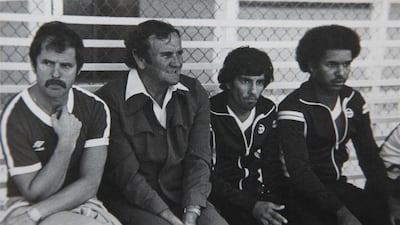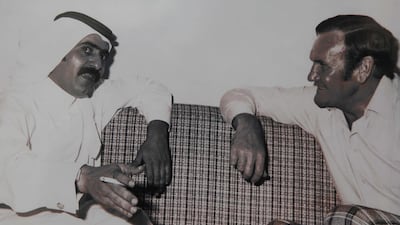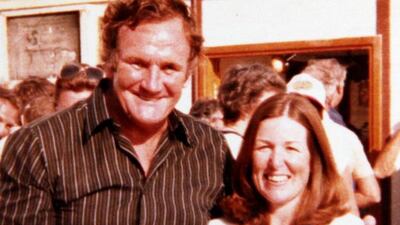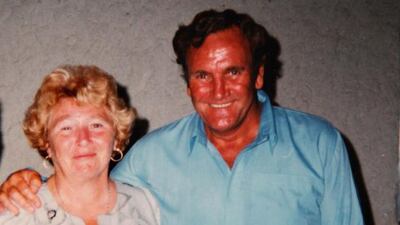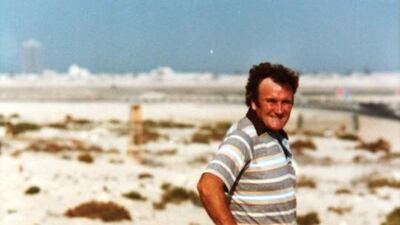Here is the sixth part in our summer series celebrating sporting milestones in the UAE. In this edition, Ali Khaled looks back at Don Revie managing the UAE national team.
For the English media, Don Revie’s decision to quit his job as England manager to coach the UAE bordered on treason.
On July 12, 1977, news of his departure was famously revealed in the Daily Mail; "Revie Quits Over Aggro," ran its headline. A four-year, £340,000 (Dh194,000) deal had the rest of an indignant media labelling him a mercenary. A 10-year ban from football by the English FA followed.
For the UAE, however, snatching the manager of the country that had given football to the world was nothing short of a coup.
It was a statement of intent by a country barely six years into its existence keen on making a name for itself on the international scene, and not just in football.
Revie was seen as the man who would whip the country’s amateur footballers into shape.
As manager of Leeds United he had presided over one of the best, most efficient and physical teams that England had produced at the time. It was these qualities that the UAE Football Association were hoping he would bring to its fledgling national team.
Revie’s international record with England, however, had been poor. A 2-0 loss to Italy in late 1976 meant that when he took flight to the Gulf the following summer, his home country had all but been eliminated from the 1978 World Cup in Argentina.
There had also been allegations, never proven, of bribery. It would emerge later that he quit the England job because the sack was imminent.
Managing the UAE offered the chance of a fresh start.
FIND THE REST OF THE MEMORY LANE SERIES HERE
"He was given a torrid time, because he broke the story to one newspaper (the Daily Mail) and the other papers resented that," his son, Duncan Revie, told The National in 2010. "But what he actually did was take a job before he lost his current one. What the public didn't understand was that he was about to be sacked by England — there's no question about that."
The change of scenery would not bring immediate change in fortune. Emirati football was still at an elementary stage, and Revie’s appointment would be no magic bullet. The whole of the UAE’s international experience at that point had been three Gulf Cup of Nations tournaments in 1972, 1974 and 1976, a few minor regional competitions and a scattering of friendlies. With the brilliant Iraqi and Kuwaiti teams of that era dominating the region, the UAE, like Oman, Qatar and even Saudi Arabia, were whipping boys in the mid-1970s.
Huge losses were the norm. In the 1976 Gulf Cup, the UAE lost four matches and drew two on the way to finishing sixth out of seven teams.
Revie had a two-pronged mission when he took over: improved showing at the 1979 Gulf Cup, eventually held in Iraq after the UAE could not host on the originally-scheduled date of 1978, and qualifying for the 1980 Asian Cup in Kuwait.
He immediately set about transforming the set-up of the national team, from training and tactics, to facilities and player conduct.
Off the pitch, Revie tried to introduce a sense of professionalism and discipline to the national team squad.
On it, he brought a more direct, physical style to the team.
Revie’s first competitive action came in the Gulf Cup in March 1979. Played in Baghdad under political tensions in the wake of the signing of the Camp David Accords between Egypt and Israel that same month, it was disaster for Revie and his team.
The UAE lost their first match 2-1 to Saudi Arabia, and things got worse after that with defeats to Bahrain (3-0) and Qatar (1-0).
The nadir came against Kuwait with a humiliating 7-0 loss. At the end of the match, the commentator on Abu Dhabi television put the defeat squarely on Revie’s doorstep.
“Don’t blame the players, blame Revie and the management,” he said as the final whistle went.
The next match brought a 5-0 thrashing against Iraq. Though the UAE saved a little face with a 4-0 win over Oman in their last fixture, the writing was on the wall. The Revie experiment was, on the field at least, a failure.
The sentiment echoed the views of many Emiratis, including, it emerged later, some of the players. The preparations had got off to chaotic start.
“Don Revie had organised a training camp at Muqattam in Egypt,” Jassem Mohammed of Sharjah told prominent Emirati journalist and football historian Mohammed Aljoker. “Then we discovered that the hotel we were staying at was falling apart due to an earthquake that had taken place earlier.
“Structural experts were testing the building, and we ended up on the street, having our meals at the Sheraton, and resting on the team bus because we were too scared to go back to our hotel.”
Discontent among the squad spread as soon as they landed in Iraq.
“We were all affected by the situation and that played a big part in our performances in the Gulf Cup,” Mohammed said. “The manager made a lot of mistakes by changing the roles of many players just before the tournaments started, and that led to the disorganisation that led to the our poor results in Iraq.”
The sense of confusion was not helped by a bizarre incident that Aljoker recalls in his book The Gulf Cup: A Life’s Journey.
“There was a decree that the tournament’s play be suspended for one day as a sign of opposition against the Camp David Accords,” he wrote. “Those present were called on to convene in the hotel’s lobby immediately as Iraqi Vice President Saddam Hussein wanted to address the players and media, so we were hurried from our rooms to listen to a fiery speech by Saddam.”
On a personal level, Mohammed also recalls that despite having a knee injury, “Revie insisted on selecting me and I needed pain-killing injections so that I wouldn’t be in pain”.
Other players felt belittled by Revie. Al Ahli goalkeeper Hassan Al Amir, a veteran of two previous Gulf Cups in 1974 and 1976, recalls a sense of chaos over proceedings and lack of trust in the manager’s methods hanging over that period.
"I remember Revie had a meeting with the players and he said to me and Ibrahim Rida, 'you are nowhere near the level of Peter Shilton or Ray Clemence'," Al Amir told Al Bayan newspaper. "Our captain, Ahmed Eissa, refused to speak to the press until we got home.
“It was a shame that the coach insisted on constantly changing the line-up for every match to the point that you never knew who would start in the next match, as that created a sense of instability.
“He was inconsistent.”
The Asian Cup qualifiers, held in Abu Dhabi in January 1979, brought a slight improvement.
Two 0-0 draws with Lebanon and Syria, as well as a default 2-0 win against withdrawn Bahrain, were enough to see the UAE reach the finals in Kuwait without scoring a goal on the field.
"Overall this was a tremendous achievement for our young team," Revie wrote in his regular column for the Gulf News newspaper, following the draw with an experienced Syria team.
The UAE’s first qualification to a major tournament was the results of weeks of hard work, according to Revie. “We sorted out the tactical problems after every game and brushed up on our free kicks, corners and throw-ins. The preparation was building nicely towards the games that mattered,” he wrote. “Finally the UAE can be proud of their magnificent stadium and tremendous facilities in that stadium, which has to be seen to be believed. They have every facility that a top international side needs.”
That was not enough to save Revie’s job, though, and he left the hot seat in May 1980, four months before the finals in Kuwait.
“Perhaps his tactics were too advanced for us, or maybe he just failed,” Al Amir said. “I remember when we returned from Baghdad he said that the UAE will not get to the World Cup for another 10 years, and his prediction came true in Italy.”
Though Revie had no direct part in that achievement, his son says the foundations he built, unappreciated at the time, played a big part in subsequent successes.
“Dad was definitely a pioneer,” Duncan said. “He introduced tactical ideas and coaching techniques that had not been seen in (the Middle East) before.
“He was proud of what he did and what he achieved. He started introducing the professionalism that eventually helped the UAE qualify for the 1990 World Cup finals in Italy.”
Revie, unlike many who followed in his footsteps as national team coach in the coming decades, did not leave the UAE.
He coached Al Nasr between 1980 and 1983 but failed to win any trophies with the country’s oldest club, and he later joined Egyptian giants Al Ahly.
Until he died on May 26, 1989, he maintained a healthy relationship with the country’s leadership and football authorities.
“They had a vision,” his son said. “Not just about sport, but events generally.”
The UAE did go on to put itself on the sporting map, but Revie’s time in the UAE is mostly remembered for the Gulf Cup debacle.
Results do not lie, but perhaps in time, history will come to judge his contribution to Emirati football on more than just cold statistics.
FOLLOW US ON TWITTER @NatSportUAE
